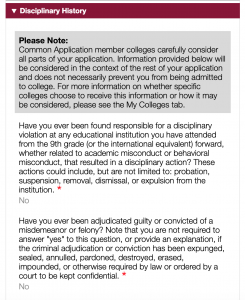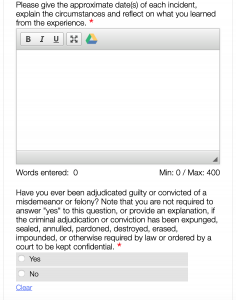
The Common Application has announced that the 2019-2020 essay prompts will remain the same as the 2018-2019 essay prompts. Based on extensive counselor feedback, the existing essay prompts provide great flexibility for applicants to tell their unique stories in their own voice. Retaining the essay prompts provides the added benefit of consistency for students, counselors, parents, and members during the admissions process.
Plus, with essay prompts remaining the same, students rolling over their existing Common App accounts have more time to plan and prepare their applications prior to the final year of high school.
2019-2020 Common Application Essay Prompts
1. Some students have a background, identity, interest, or talent that is so meaningful they believe their application would be incomplete without it. If this sounds like you, then please share your story.
2. The lessons we take from obstacles we encounter can be fundamental to later success. Recount a time when you faced a challenge, setback, or failure. How did it affect you, and what did you learn from the experience?
3. Reflect on a time when you questioned or challenged a belief or idea. What prompted your thinking? What was the outcome?
4. Describe a problem you’ve solved or a problem you’d like to solve. It can be an intellectual challenge, a research query, an ethical dilemma – anything that is of personal importance, no matter the scale. Explain its significance to you and what steps you took or could be taken to identify a solution.
5. Discuss an accomplishment, event, or realization that sparked a period of personal growth and a new understanding of yourself or others.
6. Describe a topic, idea, or concept you find so engaging that it makes you lose all track of time. Why does it captivate you? What or who do you turn to when you want to learn more?
7. Share an essay on any topic of your choice. It can be one you’ve already written, one that responds to a different prompt, or one of your own design.
During the 2018-2019 application year, the most popular topic of choice was: “Share an essay on any topic of your choice. It can be one you’ve already written, one that responds to a different prompt, or one of your own design.” (24.1%). The next most popular topics were: “Discuss an accomplishment, event, or realization that sparked a period of personal growth and a new understanding of yourself or others.” (23.7%), followed by “The lessons we take from obstacles we encounter can be fundamental to later success. Recount a time when you faced a challenge, setback, or failure. How did it affect you, and what did you learn from the experience?” (21.1%).
“The prompts as they exist today offer a broad range of approaches, accommodating students with a diverse set of experiences and ideas about the world to respond in a thoughtful and illuminating manner,”‘ said Ian Watson, Associate Director of College Counseling at The Rivers School (Weston, MA).
Contact us to learn more about how we help students craft a killer Common App essay!
*Stay in the know! Subscribe for news, tips, and advice*











